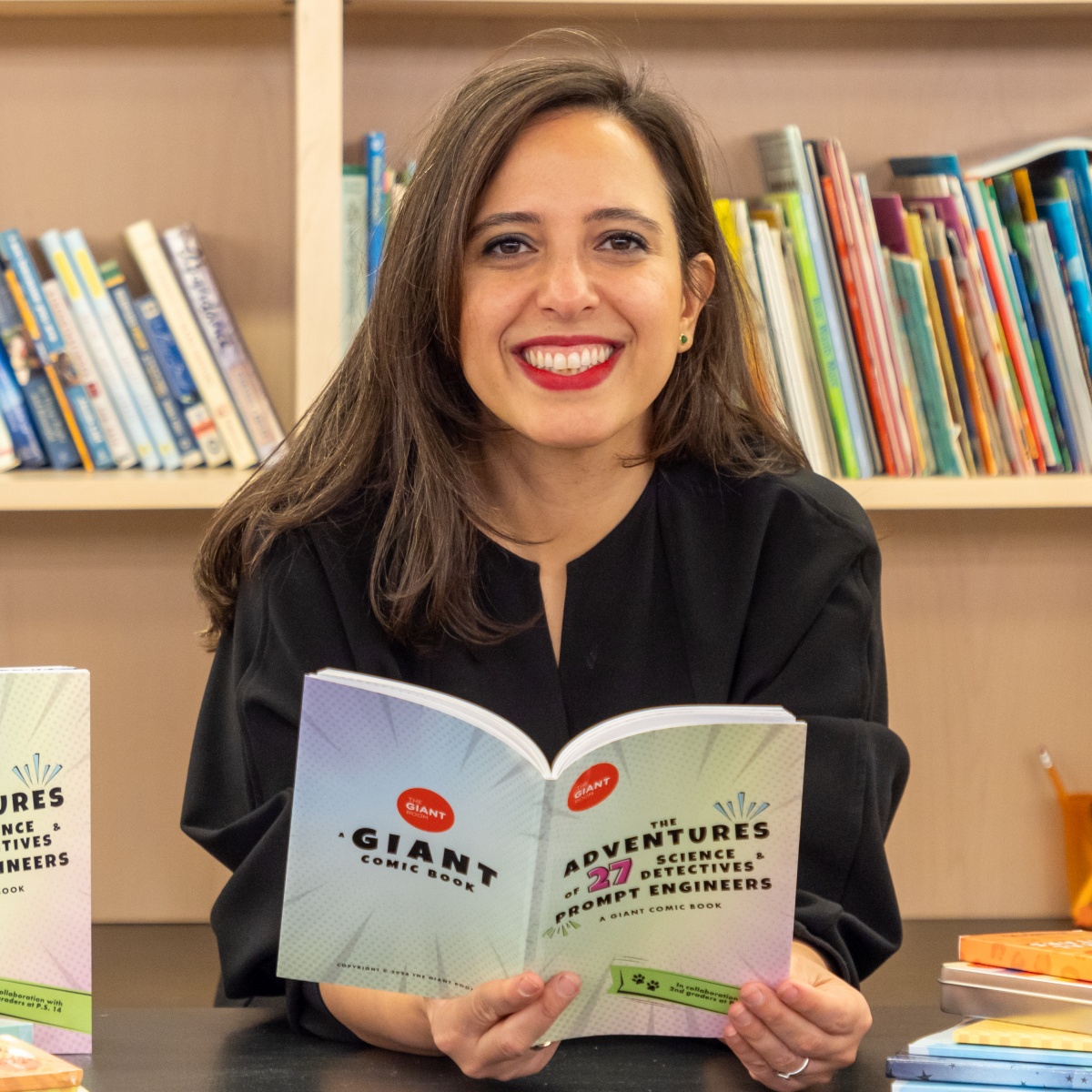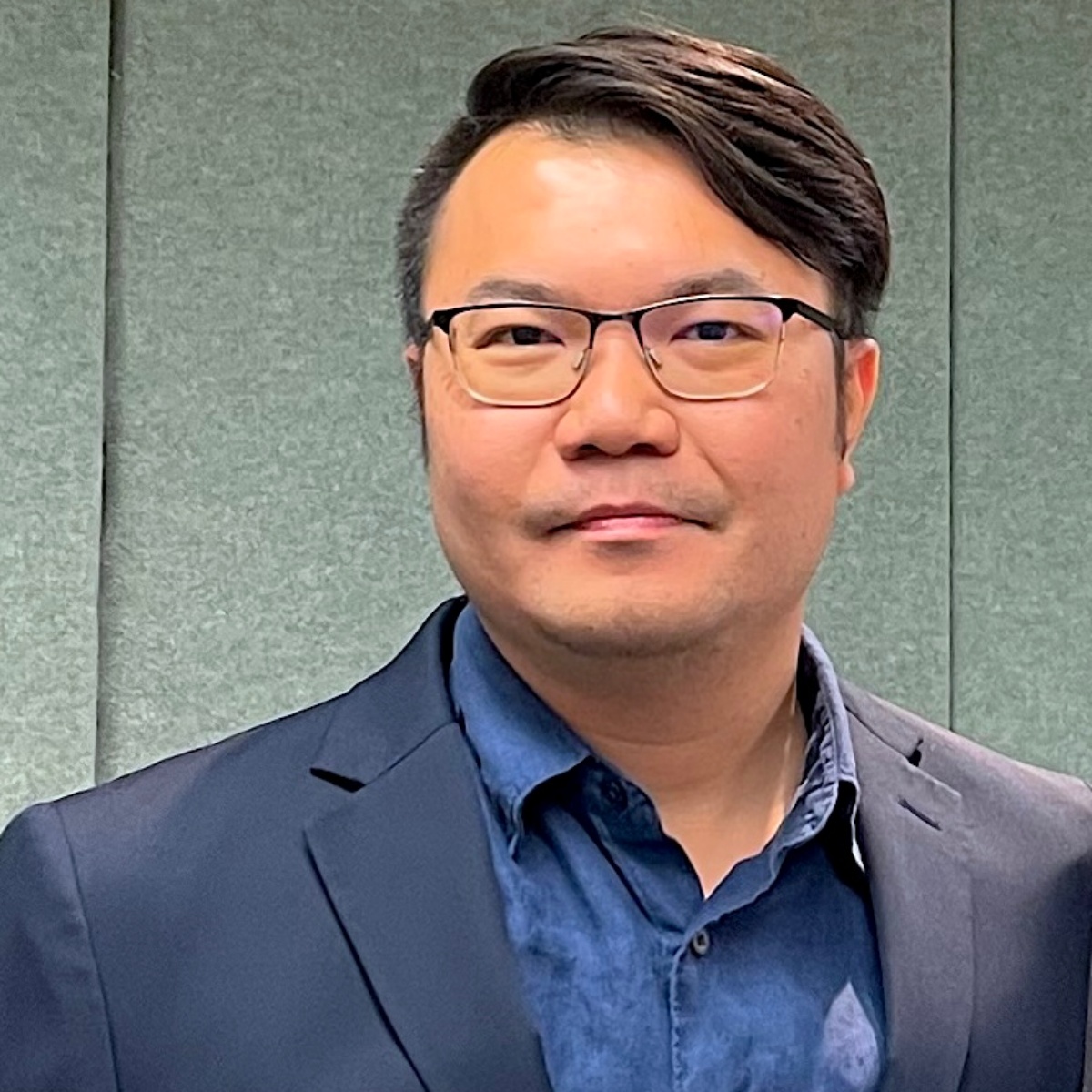Before 2022, when most alumni graduated from Teachers College, generative artificial intelligence tools such as ChatGPT were still largely the stuff of Silicon Valley imagination. Nevertheless, TC alumni were prepared to tackle the promise and pitfalls of AI with their foundational preparation in problem-solving and ed tech. As the public contends with an AI-driven future, we caught up with a few recent alumni on their work in the field.
Teachers College Building

Azadeh Jamalian (Ph.D. ’14, Cognitive Studies). (Photo: Erin Patrice O’Brien)
Azadeh Jamalian (Ph.D. ’14, Cognitive Studies), CEO of education-technology start-up The GIANT Room
What if young learners could leverage tech to advance their growth, rather than using it as a shortcut to avoid learning? That core belief drove Azadeh Jamalian (Ph.D. ’14) in 2018 to build on her start-up background and launch The GIANT Room, which offers play-based, STEM and design thinking learning opportunities to young students. Now, AI is added as another tool in GIANT Kids’ toolbox. The GIANT Room has partnered with the Joan Ganz Cooney Center from Sesame Workshop and the Robin Hood Fund for Learning and Technology to pilot a new program that integrates creative writing, AI literacy, and science for second and third graders at two schools in Queens.
In using AI as a tool for visual expression and prototyping, Jamalian explains, kids see that the technology is sometimes flawed and that humans still call the shots. “They learn you are in the position of power to actually iterate and make changes — and AI is like another pair of scissors, a tool in the service of your ideas,” says Jamalian, whose 2019 TED Talk also spoke to the importance of empowering students in the classroom.
The task for educators lies in helping kids learn how to effectively communicate with AI software and leverage it to bring their ideas to life. “It’s a process,” she said, “of not only learning how the engineering works, but really trying to find the words to express what is on their mind.”
[Children] learn you are in the position of power to actually iterate and make changes — and AI is like another pair of scissors, a tool in the service of your ideas.
Teachers College Building

Nina Bamberg (M.A. ’20, International Education Development). (Photo courtesy of Bamberg)
Nina Bamberg (M.A. ’20, International Education Development), Director of Curriculum and Instruction at PedagogyVentures
While public discourse often focuses on AI’s pitfalls, innovators have the opportunity to shape what ethical usage looks like. Nina Bamberg (M.A. ’20) is in that group, overseeing a promising classroom tool that — among its many features — helps teachers facilitate Socratic seminars, and leverage creative opportunities like AI-driven conversations with historical figures and debates.
“I feel like I'm using my TC experience and where my passions have been to apply them to this space,” explains Bamberg, whose TC background in human rights and international education serves as the foundation for her work.
“We’re thinking about what AI means for education. How do we interact with it in a way that's responsible and ethical?” explains the TC alum, who continues to work closely with her former TC instructor Felisa Tibbitts on developing a professional development course around AI and human rights.
As far as what’s next, Bamberg hopes her work is empowering teachers to decide how AI can best work in the classroom. “It's going to take teachers trying things out, and it's going to take student voices being part of the conversation,” she said, “and then eventually that can help shape what the bigger policies might be.”
My degree really prepared me for thinking through the big questions around the human impact of what's going to happen to people because of AI.
Teachers College Building

Eddie Lin (Ed.D. ’21, Instructional Technology & Media). (Photo courtesy of Lin)
Eddie Lin (Ed.D. ’21, Instructional Technology & Media), data scientist at Meta
While AI presents new challenges and opportunities across fields, Eddie Lin (Ed.D. ’21) demonstrates how the ability to think through complex problems remains at the forefront of what success will look like. At the social media giant Meta, Lin focuses on quality assurance within AI programs and large-language models.
“A lot of this stuff was not part of the curriculum or part of the background training I received at TC,” he explained, “but TC did set me up for success and set a good foundation to really understand all this.”
As a student earning his degree in instructional technology and media, Lin worked closely with TC faculty like Charles Lang and Sandra Okita to better understand the links between machine learning (another term for AI) and pedagogy. But the most profound lesson from this training wasn’t related to tech alone — rather, the value of uncertainty in searching for the best solutions.
“We were talking about some kind of research without a good answer — debating the topic because there is no good [singular] answer to many of these questions,” recalls Lin. “That's our mission, right? That's what we should go out and do after we graduate — never stop searching for the answers to the most complex questions.”
Published Wednesday, Jun 25, 2025









